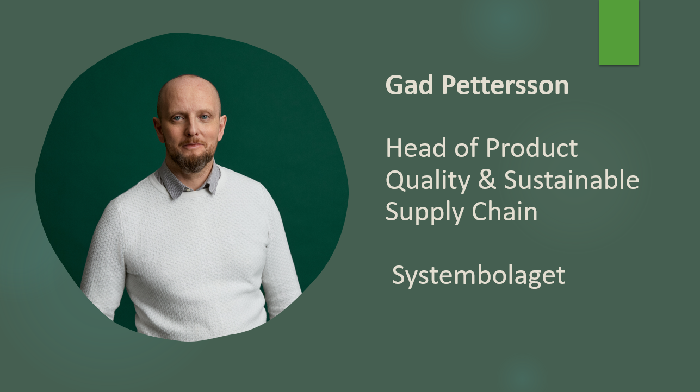
Systembolaget’s mission is to sell alcohol beverages responsibly while offering first class service. It is a retail monopoly not driven by profit or sales. We sat down with Gad Pettersson, Head of Product Quality & Sustainable Supply Chain at Systembolaget.
Please introduce yourself and your role within Systembolaget and the Carbon Data Collection pilots.
I have over 25 years of experience at Systembolaget, having served as a Wine Buyer and Category Manager for Wine, and contributed to the development and implementation of our assortment evaluation model. Today, I focus on delivering on Systembolaget’s ambitious climate and sustainability goals.
Over recent months, Systembolaget and various stakeholders have discussed both the challenges and opportunities related to carbon data collection. What are your key takeaways?
First and foremost, we are encouraged by the shared recognition across our organisations of the urgent need for climate action. As a major retailer, Systembolaget understands the influence our decisions have on the beverage industry. Our climate responsibilities are shaped by expectations from both the public and private sectors, including our owner, the Swedish government.
We have openly communicated our long-term climate ambitions, despite not yet having all the answers regarding how and when Product Carbon Footprint (PCF) data will be used in reporting, customer communication and assortment decisions. By doing so, we aim to provide producers and growers with long-term clarity and direction.
We are among the first in our sector to seek primary climate data at the product level. Introducing new methods can initially feel challenging, but we believe PCF is a valuable opportunity for suppliers to identify pathways to reduce emissions—and, in many cases, also lower costs. The PCF tool is offered free of charge, and we are committed to sharing insights, success stories, and best practices with spiritsEUROPE and its members. While there are many ways to address the climate challenge, we have chosen an approach that we believe simplifies the path ahead.
A new pilot on carbon data collection begins on 5 May 2025, with reporting scheduled during May and June. What kind of support—technical or otherwise—can participating companies expect? Will language support extend beyond English and Swedish?
All companies participating in the pilot have been invited to kickoff meetings, training sessions, and weekly Q&A forums since April. These sessions are offered multiple times to accommodate various time zones and are conducted in English. We also welcome requests for individual support. Our goal is to make the reporting process as straightforward as possible, allowing participants to focus on the value of the insights and simulations provided by the tool once data has been submitted. To enhance accessibility, all key documents have been translated into French, Spanish, Portuguese, Italian, and Afrikaans.
Comprehensive information on our work with Product Carbon Footprints is available on our dedicated website: Product Carbon Footprint | Systembolaget. Technical platform support is continuously provided by CarbonCloud, our reporting platform supplier.
What feedback mechanisms will be in place to help improve the carbon data collection process?
Feedback from participants is a vital part of the pilot. We will gather input continuously—through structured meetings, dedicated feedback channels, and in our day-to-day dialogue with reporting companies. This will help us adjust and refine the process based on real experiences.
We understand the Nordic alcohol monopolies are aligning on the methodology Systembolaget is piloting. Are large retailers also engaging with this approach?
The PCF methodology has been developed in close collaboration with our Nordic counterparts. We are also in ongoing dialogue with several major European retailers and, beyond Europe, through the Sustainable Wine Roundtable. Many of these retailers are already collecting primary climate data in other product categories and are eager to follow and learn from our pilot.
How can the reporting burden on spirits producers be reduced, in line with broader European efforts to cut red tape for businesses?
The PCF initiative is not only about reporting - it is fundamentally about understanding where we stand today and identifying the most effective actions to reduce products climate impact. In that sense, data collection is a tool for progress.
We believe the methodology we are building, which is grounded in science and best practice, strikes an appropriate balance between precision and flexibility. For those who already have their data available, the reporting process should require just a few hours.
Would you like to share any final thoughts or reflections?
We are deeply appreciative of the widespread support we are receiving from producers who are committed to reducing their climate impact. This joint effort is essential to drive meaningful change and to ensure the industry’s future prosperity.